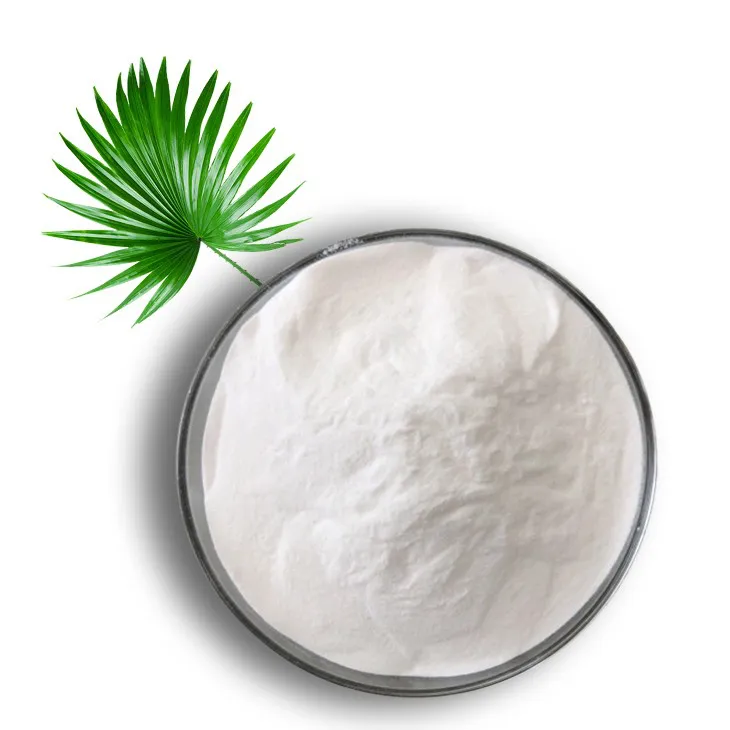- 0086-571-85302990
- sales@greenskybio.com
Explain the process of main components of Saw Palmetto from Saw Palmetto extract.
2024-12-01

1. Introduction
Saw Palmetto Extract is a substance that has been the focus of much research due to its potential health benefits. It is a complex mixture of various components, each playing a unique role. Understanding these main components is crucial for a comprehensive understanding of the extract.

2. Essential Oils
Essential oils are one of the prominent components of Saw Palmetto Extract. They are responsible for the characteristic aroma of the plant.
2.1 Limonene
Among the components within the essential oils, limonene stands out. It not only gives saw palmetto its distinct smell but may also possess certain properties that can enhance mood. Limonene has been studied for its potential to interact with the body's endocannabinoid system, which is involved in regulating various physiological processes, including mood, appetite, and pain perception. However, further research is needed to fully understand the extent of its mood - enhancing effects in the context of Saw Palmetto Extract.
2.2 Other Components in Essential Oils
Besides limonene, there are other components in the essential oils of saw palmetto. These components may work together in a synergistic manner. For example, some may have antibacterial or antifungal properties, which could potentially contribute to the overall health benefits associated with saw palmetto extract. They may also play a role in attracting or repelling certain organisms in the plant's natural environment.

3. Proteins
Although present in relatively small amounts, proteins are an important part of the saw palmetto composition. These proteins can have diverse functions.
3.1 Enzymatic Reactions
Some of the proteins in saw palmetto may be involved in enzymatic reactions. Enzymes are biological catalysts that speed up chemical reactions in living organisms. In the case of saw palmetto, these protein - based enzymes could be involved in processes such as the synthesis or breakdown of certain compounds within the plant. For example, they may be involved in the metabolism of carbohydrates, lipids, or other metabolites. This enzymatic activity can have implications for the overall composition and quality of the saw palmetto extract.
3.2 Binding Capabilities
Saw palmetto proteins may also possess specific binding capabilities. They could bind to other molecules, either within the plant or potentially when the extract is introduced into a biological system. This binding could be important for various functions, such as transporting nutrients, signaling between cells, or interacting with receptors. For instance, a protein in the extract may bind to a specific receptor in the human body, triggering a series of physiological responses. However, more research is required to identify the specific binding partners and functions of these proteins in the context of saw palmetto extract.

4. Lipids
Lipids in saw palmetto are quite diverse and play significant roles.
4.1 Glycerides
Glycerides, which are a type of lipid, are important for energy storage within the plant cells of saw palmetto. In plants, glycerides are synthesized and stored as a reserve of energy that can be utilized during periods of growth, stress, or reproduction. When considering the use of saw palmetto extract in certain applications, the presence of glycerides may also have implications. For example, in the development of dietary supplements or topical products, the lipid content, including glycerides, can affect the texture, stability, and absorption properties of the final product.
4.2 Other Lipids
In addition to glycerides, there are other types of lipids in saw palmetto. These may include phospholipids, sterols, and fatty acids. Phospholipids are important components of cell membranes, both in the plant cells of saw palmetto and potentially in the cells of organisms that interact with the extract. They play a crucial role in maintaining the integrity and fluidity of cell membranes. Sterols, on the other hand, can have various functions, such as influencing membrane permeability and acting as precursors for the synthesis of hormones or other bioactive molecules. Fatty acids are building blocks of lipids and can also have their own unique properties. For example, some fatty acids may have anti - inflammatory properties, which could contribute to the potential health benefits associated with saw palmetto extract.
5. Minerals
Although present in trace amounts, minerals such as potassium and magnesium are part of the saw palmetto extract and can influence its physiological functions.
5.1 Potassium
Potassium is an essential mineral that plays important roles in various physiological processes. In the context of saw palmetto, potassium may be involved in maintaining the proper functioning of plant cells. It can affect the osmotic balance, which is crucial for cell turgor and overall plant structure. When the extract is used, potassium may also interact with biological systems in the body. For example, it is involved in nerve conduction and muscle contraction in humans. However, the exact mechanisms by which potassium in saw palmetto extract may affect human health are still not fully understood.
5.2 Magnesium
Magnesium is another mineral present in saw palmetto extract. Magnesium is a cofactor for many enzymes, which means it is required for the proper functioning of these enzymes. In the plant, it may be involved in processes such as photosynthesis and DNA synthesis. In the context of the extract's potential use in human health, magnesium can have implications for various physiological functions. For instance, it is involved in maintaining normal heart rhythm, regulating blood sugar levels, and promoting bone health. The presence of magnesium in saw palmetto extract may contribute to its overall potential health benefits, although more research is needed to elucidate these relationships.
6. Conclusion
In conclusion, saw palmetto extract is a complex mixture of essential oils, proteins, lipids, and minerals. Each of these main components has its own unique properties and functions, both within the plant and potentially when the extract is used in various applications. Analyzing these components provides a more in - depth understanding of saw palmetto extract, which can be beneficial for further research, product development, and understanding its potential health benefits. However, more research is still needed to fully explore the interactions between these components and their precise effects on human health.
FAQ:
What are the main components of Saw Palmetto extract?
The main components of Saw Palmetto extract include essential oils (with components like limonene), proteins, lipids (such as glycerides), and minerals (like potassium and magnesium).
What role does limonene in Saw Palmetto extract play?
Limonene in the essential oils of Saw Palmetto not only contributes to the characteristic smell but may also have mood - enhancing properties.
What is the significance of proteins in Saw Palmetto?
Although in relatively small amounts, proteins in Saw Palmetto might be involved in enzymatic reactions or have some specific binding capabilities.
How are lipids in Saw Palmetto important?
Lipids in Saw Palmetto are diverse. For example, glycerides are important for energy storage within the plant cells and may also have implications when the extract is used in certain applications.
What is the role of minerals in Saw Palmetto extract?
Minerals such as potassium and magnesium are present in trace amounts in Saw Palmetto extract and can influence the physiological functions of the extract.
Related literature
- Analysis of the Chemical Composition of Saw Palmetto Extract"
- "The Main Components of Saw Palmetto and Their Biological Functions"
- "Essential Oils in Saw Palmetto: Composition and Significance"
- ▶ Hesperidin
- ▶ Citrus Bioflavonoids
- ▶ Plant Extract
- ▶ lycopene
- ▶ Diosmin
- ▶ Grape seed extract
- ▶ Sea buckthorn Juice Powder
- ▶ Fruit Juice Powder
- ▶ Hops Extract
- ▶ Artichoke Extract
- ▶ Mushroom extract
- ▶ Astaxanthin
- ▶ Green Tea Extract
- ▶ Curcumin
- ▶ Horse Chestnut Extract
- ▶ Other Product
- ▶ Boswellia Serrata Extract
- ▶ Resveratrol
- ▶ Marigold Extract
- ▶ Grape Leaf Extract
- ▶ New Product
- ▶ Aminolevulinic acid
- ▶ Cranberry Extract
- ▶ Red Yeast Rice
- ▶ Red Wine Extract
-
Natural grape seed extract
2024-12-01
-
Diosmin
2024-12-01
-
Grape Seed Extract
2024-12-01
-
Uridine-5'-monophosphate Disodium salt
2024-12-01
-
Hesperidin
2024-12-01
-
melatonin extract
2024-12-01
-
Lemon Balm Extract
2024-12-01
-
Saw Palmetto Extract
2024-12-01
-
Aminolevulinic acid
2024-12-01
-
Dandelion Root Extract
2024-12-01




















